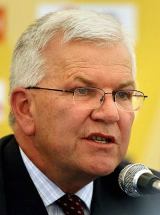Malcolm Speed, the chief executive of the ICC, felt that the ICC has done
its bit to keep cricketers up to date with banned substances that most
commonly cause problems in sport and termed it "disappointing" that two of
Pakistan's premier bowlers had failed a drug test before their opening
game of the Champions Trophy.
"Players have been tested since 2002," said Speed while addressing the
media in Jaipur, "and I believe they're well aware of the substances on
the list, as well as substances that most commonly cause problems for
other sports. A number of times, the list has been advised to the cricket boards.
This is not the first tournament when ICC has tested for drugs. We started
in 2002 at the Under-19 World Cup in New Zealand. We've tested at two more
U-19 World Cups thereafter. We also did the test in the 2004 Champions
Trophy in England as well as the 2003 World Cup in South Africa."
He also clarified that the tests conducted on the 19 Pakistan players were
done entirely at the initiative of the Pakistan Cricket Board (PCB),
adding that four other countries had also conducted regular tests for
their players. "Cricket is regarded as a low-risk sport in terms of
doping," he continued. "But five of our members - England, South Africa,
Pakistan, New Zealand and Australia - carry out regular testing within
their own countries. The ICC has signed the World Anti-Doping Association
(WADA) code, as have most countries."
Speed also revealed that the WADA code provided players the defence
option. "Under the WADA code, there are options for the player to prove no
significant fault and no performance enhancing effect of the substance.
There are some defences available there, under the WADA code."
But would the ICC accept the PCB's verdict on Shoaib Akhtar, even if they feel it
was too light? "I don't want to speculate about matters in the future,"
Speed continued. "There's nothing in the ICC's anti-doping policy that
states that we can come in there [if Pakistan deliver the judgement and the
ICC are not happy] but probably WADA can come in if they aren't happy.
Again that's only if the PCB have signed the WADA agreement. During the Shane
Warne incident, WADA made comments about his one-day ban. They might have
had the right to appeal but they chose not to."
Speed wasn't willing to make too many comments on Shoaib, and how this ban
could affect his international career. "Shoaib has always been an exciting
cricketer, a character," he added, "and history will judge him the way it
has to."

